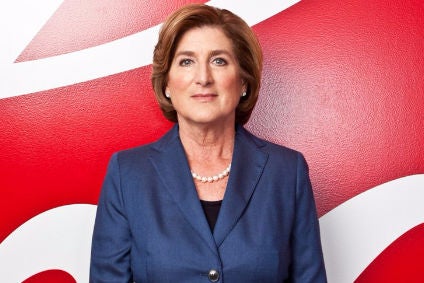In her seven years at the helm of Campbell Soup Co., there has been plenty to admire about the work done by outgoing president and CEO Denise Morrison. But, ultimately, Dean Best, writes, Morrison leaves with the US giant facing significant issues, not least in its still problematic legacy, domestic, soup business.
There was some eye-catching news out of the US today (18 May), with Campbell Soup Co. announcing president and CEO Denise Morrison had decided to step down after seven years at the helm.
Morrison, who leaves the Campbell’s soup and Kettle Chips snacks maker today, took the top job in 2011 after eight years with the business.
In many ways, Morrison has been one of the more proactive of the chief executives who lead the Big Food group of food manufacturers in trying to react to the changes in consumer habits that are reshaping the sector in the US, which are also of course being seen in (though less important to Campbell) other major markets worldwide.
Under Morrison, Campbell has looked to refashion its portfolio, most notably through acquisitions, including produce-to-dressings supplier Bolthouse Farms (2012), baby-food maker Plum Organics (2013) and, just before last Christmas, US snacks giant Snyder’s-Lance.
However, there have been issues with the performance of the group’s Campbell Fresh division – of which Bolthouse is a central part – in recent quarters, including a recall that hit sales, while Campbell has faced recent tough negotiations with Walmart. Elsewhere, some on Wall Street have also argued Morrison overpaid for Snyder’s-Lance.

US Tariffs are shifting - will you react or anticipate?
Don’t let policy changes catch you off guard. Stay proactive with real-time data and expert analysis.
By GlobalDataAll the while, Campbell’s legacy US soup arm has continued to struggle.
Overall, Campbell has seen its group sales fall for three years in succession.
Today, alongside the announcement of Morrison’s departure, Campbell today announced a third-quarter loss amid pressure on margins, another period of falling US soup sales and hefty impairment charges on the Campbell Fresh arm. The company’s third-quarter results meant it also lowered its forecast for full-year earnings.
Last month, Campbell announced a reorganisation that included Luca Mignini, the president of the company’s biscuits and snacks portfolio, being installed as COO.
Given the continued question marks over chunks of Campbell’s business, some saw that revamp as a prelude to the possible exit of Morrison, although today’s announcement still raised eyebrows, coming as it does just a month later – and with Snyder’s-Lance needing to be integrated.
That said, even though Campbell did not make a link between its third-quarter numbers and Morrison’s departure, looking at the continued problems at the company, perhaps her stepping down is not much of a surprise.
What now for Campbell? As the company interviews for Morrison’s successor, Keith McLoughlin, the former CEO of appliance maker Electrolux and currently a Campbell director, will take the reins on an interim basis.
Campbell’s new financial year starts in August and the company has already flagged it expects further pressure on margins, in part due to problems outside its control, such as the fact it expects the cost of the steel and aluminium it uses to rise in the wake of the Trump administration’s tariffs on imports of the raw materials.
However, Campbell also said today the company expects the impact of Snyder’s-Lance to be “modestly dilutive” in its new financial year; at the time of the deal, Campbell said the acquisition would boost earnings.
However, Campbell also revealed it is reviewing its portfolio, indicating significant action could be on the table.
CFO Anthony DiSilvestro insisted Campbell had made “made some progress against our key priorities” in the third quarter, pointing to the completion of the Snyder’s-Lance acquisition and headway in “stabilising sales in US soup”.
However, he added: “We are not satisfied with our financial results. Our performance has been impacted by both execution-related and external challenges. We are addressing these challenges with renewed urgency. Looking ahead, we will be reviewing all aspects of our strategic plans and portfolio composition. We anticipate that our review, which will take several months to complete, will lead to changes designed to improve our operating performance and create long-term shareholder value.”
Speaking to analysts after the publication of the third-quarter results and Morrison’s departure, interim CEO McLoughlin said: “Beginning today, we will undertake a thorough and critical review of all aspects of our strategic and operating plans, including the composition of our entire portfolio. That work will inform our capital allocation and resource deployment priorities. Everything is on the table. There are no sacred cows.”
The outcome of that review will be made public when Campbell announces its full-year financial results in August.
At the time of writing, Campbell’s shares were down 12.24% at $34.42 at 13:56 ET.
Whether Morrison’s successor is named before or after that date, they will have a lengthy to-do list when they take their place.





